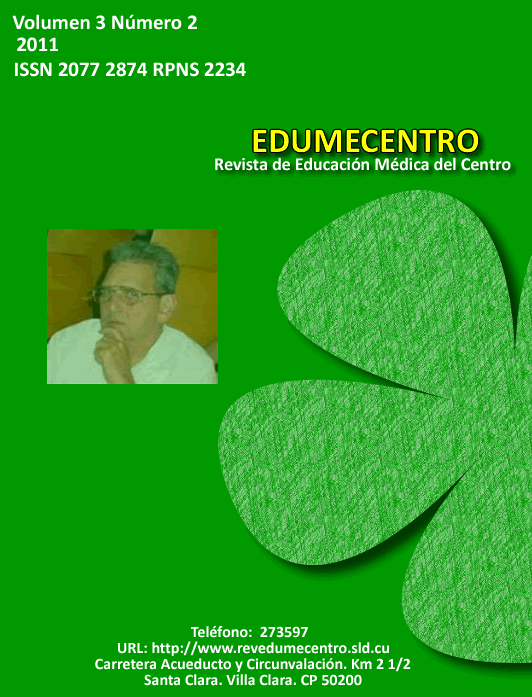The educative evaluation in the integral working formation for Health Technology students, in Clinical Lab
Keywords:
Educative evaluation, integral working formation, Clinical Lab, teaching.Abstract
The category evaluation was analyzed with the objective to redesign the evaluation system of the subject Introduction to the Clinical Lab. The qualitative and holistic approaches were applied in this research work. The formative function of the evaluation is privileged over the rest, as well as how to use it to benedict the working formation of Clinical Lab students. After analyzing the current ways to evaluate, it was determined to include activities of the investigative training at work. It was concluded that this process is of paramount importance for the teaching-learning activities. The teaching activities and that of the students depend on a great extent of the evaluation model applied, the changes in the evaluation process must be a part of an innovation program including curriculum, Didactics and evaluation, these three elements and the contents are structural and functionally interrelated.Downloads
Download data is not yet available.
Published
2013-02-11
How to Cite
1.
Díaz Hernández R de J, Díaz Rodríguez IL, Seigle Rebollar MA, García Enriquez ME. The educative evaluation in the integral working formation for Health Technology students, in Clinical Lab. EDUMEC [Internet]. 2013 Feb. 11 [cited 2026 Feb. 12];3(2):61-8. Available from: https://revedumecentro.sld.cu/index.php/edumc/article/view/124
Issue
Section
ARTÍCULO ORIGINAL
License
Los autores que publican en esta revista están de acuerdo con los siguientes términos:- Los autores/as conservarán sus derechos de autor y ceden a la revista el derecho de primera publicación de su obra, el cuál estará simultáneamente sujeto a una Licencia Creative Commons Reconocimiento-NoComercial-CompartirIgual 4.0 Internacional (CC BY-NC-SA 4.0) que permite a terceros compartir la obra siempre que se indique su autor y su primera publicación esta revista.
- Los autores pueden establecer por separado acuerdos adicionales para la distribución no exclusiva de la versión de la obra publicada en la revista (por ejemplo, situarlo en un repositorio institucional o publicarlo en un libro), con un reconocimiento de su publicación inicial en esta revista.
- Se permite y se anima a los autores a difundir sus trabajos electrónicamente (por ejemplo, en repositorios institucionales o en su propio sitio web) antes y durante el proceso de envío, ya que puede dar lugar a intercambios productivos, así como a una citación más temprana y mayor de los trabajos publicados (Véase The Effect of Open Access) (en inglés).










